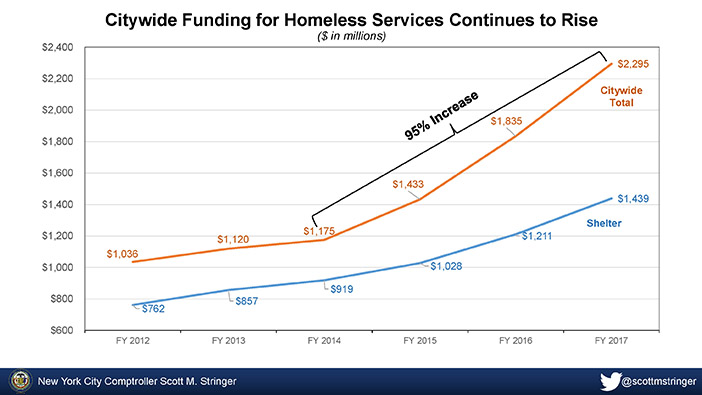Courtesy of Comptroller Stringer’s Office
According to Stringer’s analysis, the spending of agencies such as the Department of Homeless Services routinely exceeds the budget.
By Forum Staff
The City financial plan will be affected by the slowing economic growth of the five boroughs and rising fears of federal cuts under a Donald Trump White House, according to Comptroller Scott Stringer, who recently presented his analysis of NYC’s Preliminary Fiscal Year 2018 Budget.
“Our economy is strong, but with the pace of growth slowing and with uncertainty surrounding the Trump White House mounting, we have to prepare for whatever comes our way. I believe that we must prepare for the challenges ahead,” Stringer said. “Mayor De Blasio has presented a Preliminary Budget that contains a number of laudable new initiatives, which I support. Yet, as we face challenges ahead, we will have to grow our budget cushion and a more vigorous agency savings program will be necessary.”
Stringer’s analysis covered several aspects of the City’s Preliminary Budget and the state of NYC’s economy, including:
The rate of economic growth is expected to slow for New York City during the Financial Plan period (2017-2021)
- The current economic expansion since the Great Recession will go on record as one of the strongest, Stringer said. The City has created 635,000 jobs since 2009, totaling a historic high of nearly 4.4 million jobs, and unemployment rates are down in all five boroughs.
- Over half of new jobs have been in industries such as retail, leisure and hospitality, and healthcare, where wages are generally low.
- Real earnings for high-income sectors saw dramatic rises between 2009 and 2015. Lower paid workers, in contrast, saw much smaller gains, with workers in the healthcare and education super-sector, who earn on average just $52,000, seeing no gains in real earnings at all.
- This year and next, the Comptroller’s Office expects growth to be sustained at better than 2 percent, due to a predicted artificial stimulus through potential tax cuts and proposed infrastructure spending.
- If President Trump implements his threats regarding trade and immigration restrictions, a more drastic slowdown should be expected in the years to come, Stringer noted.
Federal budget cuts could seriously harm New York’s ability to protect its most vulnerable citizens, who rely on numerous programs funded with federal aid
- The City relies on $7 billion annually in federal aid to help fund a wide range of city programs and services.
Repealing the Affordable Care Act could have a devastating impact on 1.6 million newly enrolled New Yorkers and the NYC Health + Hospitals system. NYC Health + Hospitals is in the midst of Transformation Plan to address budget gaps that reach $1.8 billion by 2021, which could be derailed by ACA repeal.
The continuing rise in homelessness spending shows the need for a clear strategy with measurable and transparent milestones
- Citywide spending on homelessness has nearly doubled to $2.3 billion in FY 2017 from $1.2 billion in FY 2014. Spending on citywide homeless services is projected to increase by $460 million over last year, the comptroller noted.
- Those dramatic rises are driven in part by the cost of commercial hotels, Stringer said; spending for which reached $102 million in calendar year 2016.

